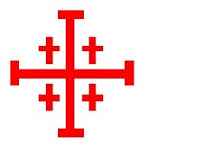Isaiah
tells us we live in the Habitation of Dragons, “And thorns shall come up in her
palaces, nettles and brambles in the fortresses thereof: and it shall be an
habitation of dragons, and a court for owls” [KJV]. Modern translators render the word for
dragons as ‘jackals,” because they don’t believe that there are such things as
dragons.
The
translators have a harder time re-interpreting the New Testament Greek word,
“drakon” as anything other than “dragon.” One primary text where the word
“dragon” occurs is in Revelation 12:1-12 where the devil is depicted as a fiery
red dragon who is cast down from heaven to earth by Michael and his angels. The
Book of Revelation goes on to add, “woe to you, O earth and sea, for the devil
has come down to you in great wrath, because he knows that his time is short!”
That is
indeed the problem! Humankind tends to operate on the assumption that we live
out our lives in a neutral zone where most of our spiritual struggles are with
ourselves or with other people.
In reality
the place where we live is a habitation of dragons, and in specific, one most
unhappy dragon, the devil. This particular dragon has discovered to his chagrin
that he is not as lofty, as beautiful, or as powerful as God. Not only that,
but he has discovered, to his great wrath, that his time is short. In his wrath
the dragon has resolved to rob everybody of the life, joy and vitality that he
has lost himself when he was cast from heaven by Michael and the angels of God.
Some limitations
of the dragon's ability need to be acknowledged; Unlike God, he is not
Omniscient, Omnipotent, or Omnipresent. In plain language, he is a created
being; he doesn't know everything, he isn't all-powerful, nor is he present
everywhere.
Unfortunately
for us the passage in Revelation tells us that when he was cast to earth in
great wrath he took his “angels” with him. The New Testament refers to these
entities as “devils,” “demons,” or as “unclean spirits.” What it means is that
we play out our moral and spiritual struggles on an uneven playing field where
unseen malicious enemies are doing their very best to make us as unhappy as
they are. The old saying, “misery loves company” is remarkably true in this
regard.
We actually
live in the habitation of dragons. St.
Paul says, “Be sober, be watchful. Your adversary the devil prowls around like
a roaring lion, seeking someone to devour.” On the other hand, living in
paranoia and fear only serves the dragon and his fallen angels. James 4:7b also
says, “Resist the devil and he will flee from you.” John the Apostle adds, “He
who is in you is greater than he who is in the world.” (1 John 4:4). Another
way of putting it is in the modern proverb, “To be forewarned is to be
fore-armed.” In Texas terms, if you are walking through a field with vipers in
it, wear a good pair of cowboy boots. Watch where you are walking and keep your
guard up.



